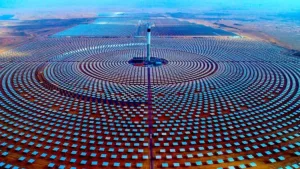The global push for clean, renewable energy has taken a dangerous turn, with the potential to ignite major geopolitical conflicts. U.S. engineers have uncovered undisclosed “self-destruct” mechanisms embedded in Chinese-manufactured solar panels, raising alarms about national security.

This discovery, which caught experts by surprise, could amplify existing global tensions into a far more serious confrontation.
According to a Reuters report citing U.S. energy and security specialists, Chinese-made solar equipment contains hidden “ghost functions.” Technical experts found covert devices within inverters—components critical to solar energy systems—that can bypass firewalls and potentially be controlled remotely.
These features were not mentioned in any product documentation, fueling concerns about what else might be concealed. The implications are stark: a remote actor could theoretically disable significant portions of a nation’s power grid, causing widespread blackouts.

This vulnerability extends beyond the U.S., as countries like the UK and much of Europe also rely heavily on Chinese inverters and batteries. While similar devices haven’t been confirmed in these regions yet, the mere possibility is cause for concern.
The ability to remotely control a nation’s energy infrastructure transforms this from a technical issue into a geopolitical crisis. Mike Rogers, former director of the U.S. National Security Agency, emphasized the severity of the situation:
“China appears to see strategic value in embedding risks within critical infrastructure. The widespread use of these inverters could constrain Western responses to security threats.”

With Chinese companies supplying over half of the world’s solar inverters, their market dominance could be leveraged as a geopolitical tool, especially amid China’s strengthening ties with Russia.
This strategic alliance, seen as one of the most significant in recent years, heightens U.S. and Western concerns about dependency on Chinese technology.
No Western government has issued a formal response yet, but the U.S. Department of Energy has acknowledged the challenge of ensuring full transparency in imported equipment.
It stressed that suppliers must provide complete documentation of all components and software. In the UK, some officials are pushing for an immediate halt to the use of Chinese components in energy systems, advocating for a thorough review to eliminate risks.
The urgency of these measures is underscored by a recent incident where a nation declared trade-related conflicts with China over vulnerabilities in electric vehicles, highlighting the broader implications of reliance on Chinese technology.


